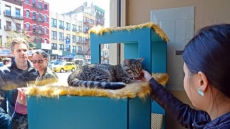While electric fans keep young adults cooler by increasing the evaporation of sweat, they may, surprisingly, have the opposite effect for those above the age of 60, suggests new research.
The heart rate and internal temperature of seniors exposed to 41.6 degree Celsius temperatures and increasing humidity levels climbed even higher when they tried to cool off with fans - instead of falling as expected, according to study findings reported in the journal JAMA.
"Although differences were small, the cumulative effect could become clinically important during prolonged heat exposure, such as during extreme heat waves," said Craig Crandall, Professor of Internal Medicine at University of Texas Southwestern Medical Center in the US.
"We know that fans keep young adults cooler by increasing the evaporation of sweat," Crandall said.
"We surmise that age-related impairments in sweating capacity make fans an ineffective means of cooling for the elderly during exceptionally hot days, and may, in fact, increase thermal and cardiac strain," Crandall noted.

Researchers studied the physiological responses of a small group of elderly patients in a high-heat, high-humidity environment.
Participants between the ages of 60 and 80 were observed for approximately two hours in a room with the temperature set at a sweltering 41.6 degrees Celsius and a humidity level that was gradually increased from 30 per cent to 70 per cent.
Not surprisingly, both heart rate and internal body temperature rose as the humidity level in the room rose.
The eight individuals in the study were tested under those conditions without a fan and, on a separate occasion, with an electric fan.
Unexpectedly, the participants` heart rates were 10 beats per minute higher and their internal temperatures marginally higher when a fan was part of the experimental environment.
Although these findings suggest that fan use may be counterproductive for seniors during heat waves, the investigators propose that fan use may still be beneficial under less extreme environmental conditions, though this needs to be confirmed.





